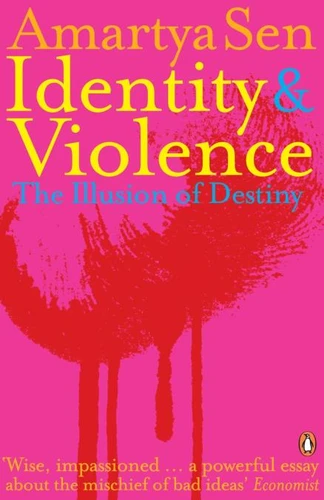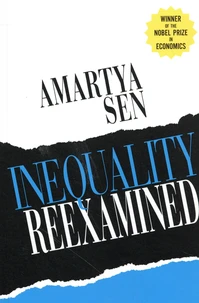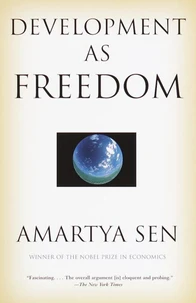Prix Nobel d'économie 1998
Identity and Violence. The Illusion of Destiny
Par :Formats :
Disponible dans votre compte client Decitre ou Furet du Nord dès validation de votre commande. Le format ePub protégé est :
- Compatible avec une lecture sur My Vivlio (smartphone, tablette, ordinateur)
- Compatible avec une lecture sur liseuses Vivlio
- Pour les liseuses autres que Vivlio, vous devez utiliser le logiciel Adobe Digital Edition. Non compatible avec la lecture sur les liseuses Kindle, Remarkable et Sony
- Non compatible avec un achat hors France métropolitaine
 , qui est-ce ?
, qui est-ce ?Notre partenaire de plateforme de lecture numérique où vous retrouverez l'ensemble de vos ebooks gratuitement
Pour en savoir plus sur nos ebooks, consultez notre aide en ligne ici
- Nombre de pages240
- FormatePub
- ISBN978-0-14-191175-5
- EAN9780141911755
- Date de parution24/09/2015
- Protection num.Adobe DRM
- Infos supplémentairesepub
- ÉditeurPENGUIN
Résumé
The world may be more riven by murderous violence than ever before, yet Nobel Laureate Amartya Sen argues in this sweeping philosophical work that its brutalities are driven as much by confusion as by inescapable hatred. Sen argues in his new book that conflict and violence are sustained today, no less than the past, by the illusion of a unique identity. Indeed, the world is increasingly taken to be divided between religions (or 'cultures' or 'civilizations'), ignoring the relevance of other ways in which people see themselves through class, gender, profession, language, literature, science, music, morals or politics, and denying the real possibilities of reasoned choices.
In Identity and Violence he overturns such stereotypes as the 'the monolithic Middle East' or 'the Western Mind'. Through his penetrating investigation of such subjects as multiculturalism, fundamentalism, terrorism and globalization, he brings out the need for a clear-headed understanding of human freedom and a constructive public voice in Global civil society. The world, Sen shows, can be made to move towards peace as firmly as it has recently spiralled towards war.
In Identity and Violence he overturns such stereotypes as the 'the monolithic Middle East' or 'the Western Mind'. Through his penetrating investigation of such subjects as multiculturalism, fundamentalism, terrorism and globalization, he brings out the need for a clear-headed understanding of human freedom and a constructive public voice in Global civil society. The world, Sen shows, can be made to move towards peace as firmly as it has recently spiralled towards war.
The world may be more riven by murderous violence than ever before, yet Nobel Laureate Amartya Sen argues in this sweeping philosophical work that its brutalities are driven as much by confusion as by inescapable hatred. Sen argues in his new book that conflict and violence are sustained today, no less than the past, by the illusion of a unique identity. Indeed, the world is increasingly taken to be divided between religions (or 'cultures' or 'civilizations'), ignoring the relevance of other ways in which people see themselves through class, gender, profession, language, literature, science, music, morals or politics, and denying the real possibilities of reasoned choices.
In Identity and Violence he overturns such stereotypes as the 'the monolithic Middle East' or 'the Western Mind'. Through his penetrating investigation of such subjects as multiculturalism, fundamentalism, terrorism and globalization, he brings out the need for a clear-headed understanding of human freedom and a constructive public voice in Global civil society. The world, Sen shows, can be made to move towards peace as firmly as it has recently spiralled towards war.
In Identity and Violence he overturns such stereotypes as the 'the monolithic Middle East' or 'the Western Mind'. Through his penetrating investigation of such subjects as multiculturalism, fundamentalism, terrorism and globalization, he brings out the need for a clear-headed understanding of human freedom and a constructive public voice in Global civil society. The world, Sen shows, can be made to move towards peace as firmly as it has recently spiralled towards war.






















